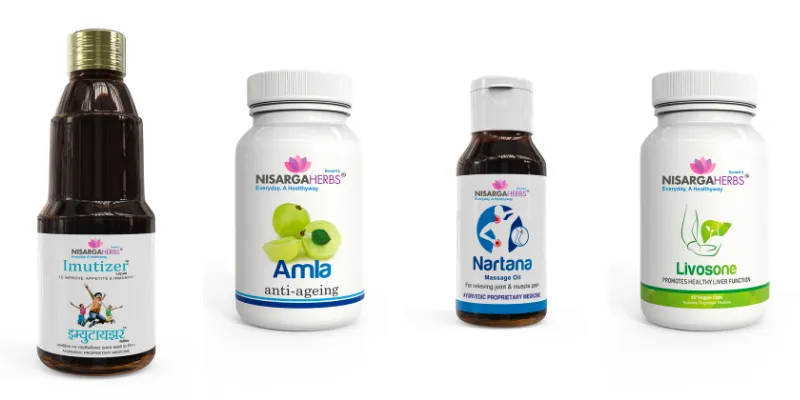How this Ayurvedic brand from Satara, Maharashtra, is seizing the global market of oil extracts
Girish Soman started Nisarga Herbs in 2011 to manufacture an extensive range of CO2 extracted essential oils, oleoresins, and herbal extracts used in the natural products industry. At present, the company clocks Rs 50 crore turnover.
In 1993, Girish Soman decided to venture into agriculture to resolve the issue of incessant use of chemical fertilisers and pesticides that plagued the farmer’s community.
Although he worked in a pipeline manufacturing company for years, Girish launched Krushitek Pvt Ltd. in 1993 in Satara, Maharashtra, to provide organic agricultural inputs to farmers.
In an interview with SMBStory, Girish narrates how he explored every opportunity that came his way — from making organic produce for farmers to incorporating technology in his offerings and later, blending Ayurveda with modern science — to become an entrepreneur raking Rs 50 crore annual turnover.
He says, “I am a structural engineer by profession. Having worked with farmers closely, I knew their pain points. I realised that biopesticide is a sunrise area, and so, I began doing my research and started the company.”
In the first year of starting up, Girish made Rs 7 lakh turnover. He realised he had chosen the right path, which further encouraged him to plan for expansion.
In 2011, Girish founded to manufacture an extensive range of CO2 extracted essential oils, oleoresins, and herbal extracts used in the natural products industry.
The birth of Nisarga Herbs
In 1998, Girish thought of exploring new technology to improve the performance of Krushitek’s biopesticides by using oil extracts. Being an IIT Bombay alumnus, he decided to approach his alma mater to use the technology for extracting oils from herbs. To his dismay, it had been exported to the US.
Thus, Girish started developing the technology in-house. And, in 1999, using the knowledge of ‘Vriksha Ayurveda,’ he extracted oils and infused them in organic fertilisers that gave him a good yield. Thus, Nisarga Biotech Pvt Ltd — the parent company of Nisarga Herbs — was launched.
In 2001, the company started exporting these extracts for healthcare products, as well as dietary supplements along with herbs used as food in the US and Europe.
“After looking at the enormous success of Nisarga Biotech, we realised that our company has great potential for using extracts in Ayurvedic supplements. We expanded the business portfolio in the west and started exporting extracts to leading biotech companies as an OEM to them. We also decided to test out the technology on Ayurvedic herbs, which are considered as food in the west,” Girish says.
A decade, a few clinical trials, and efficacy tests later, Nisarga Herbs was born in India in 2011.
“A product development centre was started in 2002 in Satara, resulting in a wide range of products of varied applications, where some raw materials were sourced locally while others imported. From creams, toothpaste, lotions, soaps to dietary supplements — all were developed for clients in the US and Europe. The same quality supplements are now provided in India for the quality-conscious customer,” the founder adds.
Girish claims that the company has filed six Indian and 12 international patents for use of its technology in the food supplement industry. In fact, it also has organic farms certified by Ecocert France.
In 10 years, Nisarga Herbs has performed a double-blind clinical trial on ADHD in children in the age group seven to 14. It has filed four patents for the same in the US and India, Girish says.
At present, with a marketing network of over 10,000 retailers in 12 different Indian states, Nisarga Biotech clocks Rs 50 crore annual turnover, where the primary selling medium is through recommendation by doctors.
How the extracts work on the body
Talking about how Nisarga’s oil extracts works, Girish says that most Ayurvedic companies use raw herbs while a few use water extracts. Here, the herb is boiled in hot water to extract the active compounds available in it. The water is then separated and evaporated to obtain concentrated actives which are soluble in water.
“Raw herbs are not always easily absorbed in the body, and we need a large amount to be consumed to get the proper concentration of actives in the body. Sometimes a large or heavy dose of raw herbs can be detrimental to the palate or overall food intake. Many herbs are bitter, and high consumption orally could lead to loss of appetite or other issues,” Girish explains.

Nisarga Herbs' product range
The water extracted oils predominantly have water-soluble compounds, where the consumer misses out on the oil-soluble/lipid compounds when consumed. Also, this process happens at a high temperature of 85-95 degrees that may lead to loss of volatiles actives, as well as cause hydrolysis, changing the molecular structure of the compounds.
Nisarga’s extraction technology helps extracts both the lipid and water-soluble molecules, which provide the full organoleptic profile of the herb, confirmed through various HPLC tests. The consumers get the benefit of the herb, but only of the active compounds, and no starch or fibres are present in these powders. Hence, Nisarga’s products have a potent mix of active compounds only.
Key milestones
Nisarga Herbs has completed a head-on trial of Nartana Capsule on osteoarthritis against diclofenac (one of the most powerful NSAID) at Dinanath Mangeshkar Hospital, Pune, for long term treatment in 2014, and published in a peer-reviewed journal in the US.
In fact, the company also launched NuAxon Bioscience in the US in 2010 to increase its market share in the country. It also founded NuAxon Research Inc in 2018 in technical collaboration with UT Health, San Antonio, Texas, to sell and license out cancer research drug based on its neem leaf extract.
One of the most recent milestones, Girish says, has been the collaboration with All India Institute of Ayurveda (AIIA), New Delhi, to conduct a double-blind, randomised, placebo-controlled trial of its COVID-19 formulation at ESIC Medical College and Hospital, Faridabad.
“Nisarga is the first Indian Ayurveda company to work with AIIA, who will study our proprietary neem extract formulation for the prevention of COVID-19 in 250 frontline medical and non-medical staff at ESIC Hospital, Faridabad, who are highly exposed to COVID-19 patients,” Girish says.
Major challenges
For Girish, being self-funded has slowed the growth of the brand, which he claims, sometimes feels challenging. However, the brand has been a stable place of employment for over 500 employees.
“We truly believe in preserving nature and it’s resources and utilising them for ethical means and not causing destruction for our long term continuation of the brand, and hence our approach to our every product is very ethical and pure,” Girish says.
However, this became a major concern when he approached doctors to trust the brand, as several people had been peddling cheap quality and inefficient products to doctors for a long time in the name of Ayurveda. It took some time for the doctors to understand Nisarga’s ideology, and eventually trust the brand.
Future prospects
Nisarga Herbs has been consistently witnessing 20 percent sales growth and 40 percent online growth for the last five years. Going forward, the brand aims to move more towards the preventive health market, using its expertise with Ayurvedic herbs, as well as herbal nutrition for specific health conditions.
“We already have business relations in various countries, including the US, the UK, Germany, Middle East, Australia, and New Zealand. We are also planning to expand our relations in South Korea. Along with this, we will also be expanding our organic farms’ coverage from 30 acres to 50 acres in the next few years to cater to the rising demand of our organic herbs for self-consumption,” Girish says.
In fact, the brand will also be developing a new FSSAI certified unit for food supplement products. The company is also open to offer its research products on the white label by entering into strategic partnerships with national players.
Edited by Suman Singh








